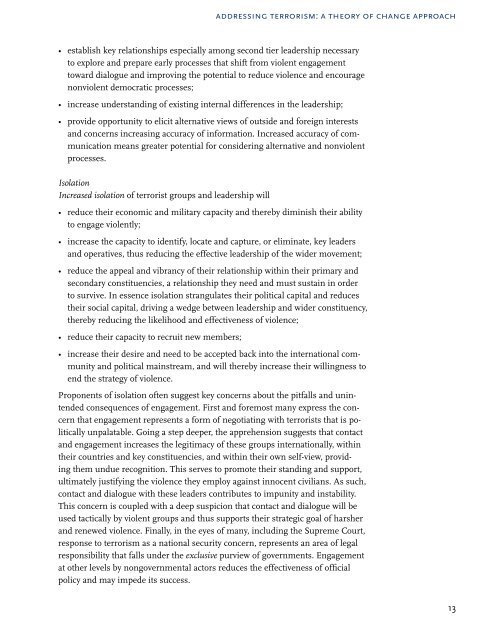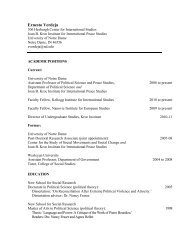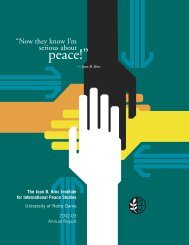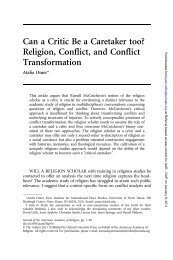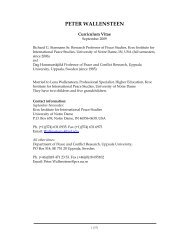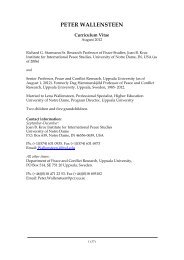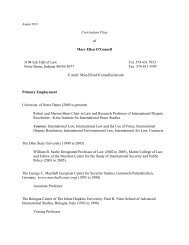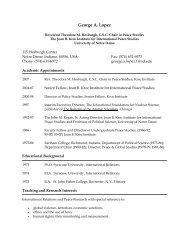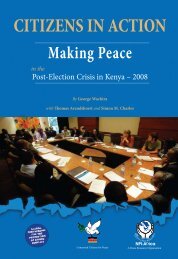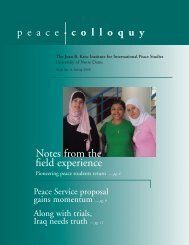Somalia: Creating Space for Fresh Approaches to Peacebuilding
Somalia: Creating Space for Fresh Approaches to Peacebuilding
Somalia: Creating Space for Fresh Approaches to Peacebuilding
You also want an ePaper? Increase the reach of your titles
YUMPU automatically turns print PDFs into web optimized ePapers that Google loves.
addressing terrorism: a theory of change approach<br />
• establish key relationships especially among second tier leadership necessary<br />
<strong>to</strong> explore and prepare early processes that shift from violent engagement<br />
<strong>to</strong>ward dialogue and improving the potential <strong>to</strong> reduce violence and encourage<br />
nonviolent democratic processes;<br />
• increase understanding of existing internal differences in the leadership;<br />
• provide opportunity <strong>to</strong> elicit alternative views of outside and <strong>for</strong>eign interests<br />
and concerns increasing accuracy of in<strong>for</strong>mation. Increased accuracy of communication<br />
means greater potential <strong>for</strong> considering alternative and nonviolent<br />
processes.<br />
Isolation<br />
Increased isolation of terrorist groups and leadership will<br />
• reduce their economic and military capacity and thereby diminish their ability<br />
<strong>to</strong> engage violently;<br />
• increase the capacity <strong>to</strong> identify, locate and capture, or eliminate, key leaders<br />
and operatives, thus reducing the effective leadership of the wider movement;<br />
• reduce the appeal and vibrancy of their relationship within their primary and<br />
secondary constituencies, a relationship they need and must sustain in order<br />
<strong>to</strong> survive. In essence isolation strangulates their political capital and reduces<br />
their social capital, driving a wedge between leadership and wider constituency,<br />
thereby reducing the likelihood and effectiveness of violence;<br />
• reduce their capacity <strong>to</strong> recruit new members;<br />
• increase their desire and need <strong>to</strong> be accepted back in<strong>to</strong> the international community<br />
and political mainstream, and will thereby increase their willingness <strong>to</strong><br />
end the strategy of violence.<br />
Proponents of isolation often suggest key concerns about the pitfalls and unintended<br />
consequences of engagement. First and <strong>for</strong>emost many express the concern<br />
that engagement represents a <strong>for</strong>m of negotiating with terrorists that is politically<br />
unpalatable. Going a step deeper, the apprehension suggests that contact<br />
and engagement increases the legitimacy of these groups internationally, within<br />
their countries and key constituencies, and within their own self-view, providing<br />
them undue recognition. This serves <strong>to</strong> promote their standing and support,<br />
ultimately justifying the violence they employ against innocent civilians. As such,<br />
contact and dialogue with these leaders contributes <strong>to</strong> impunity and instability.<br />
This concern is coupled with a deep suspicion that contact and dialogue will be<br />
used tactically by violent groups and thus supports their strategic goal of harsher<br />
and renewed violence. Finally, in the eyes of many, including the Supreme Court,<br />
response <strong>to</strong> terrorism as a national security concern, represents an area of legal<br />
responsibility that falls under the exclusive purview of governments. Engagement<br />
at other levels by nongovernmental ac<strong>to</strong>rs reduces the effectiveness of official<br />
policy and may impede its success.<br />
13


